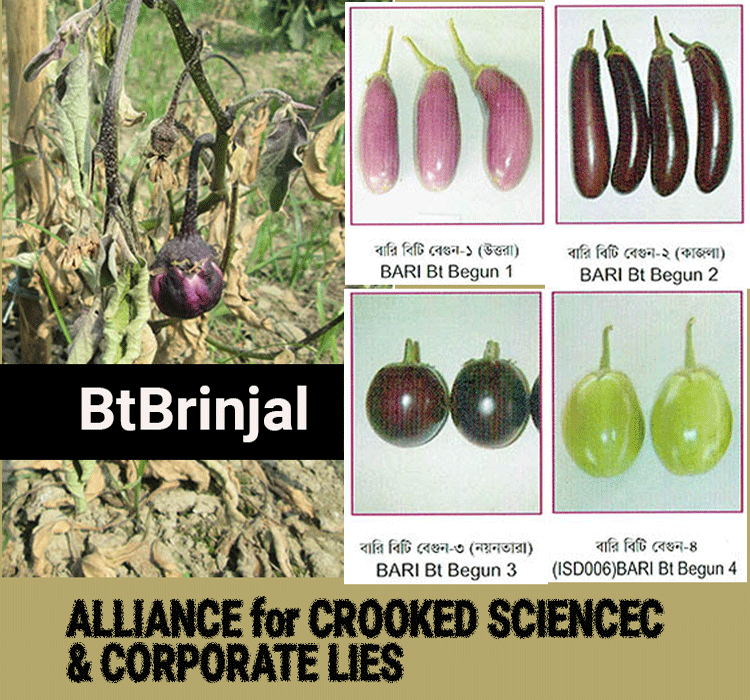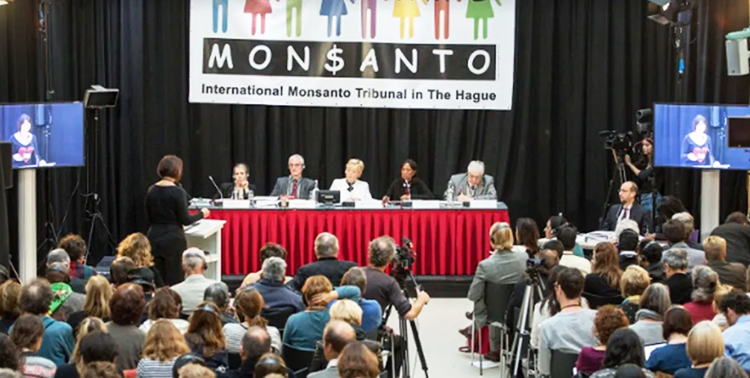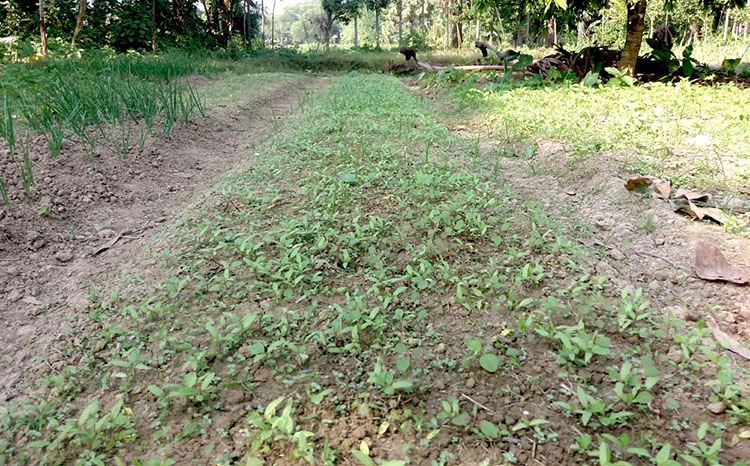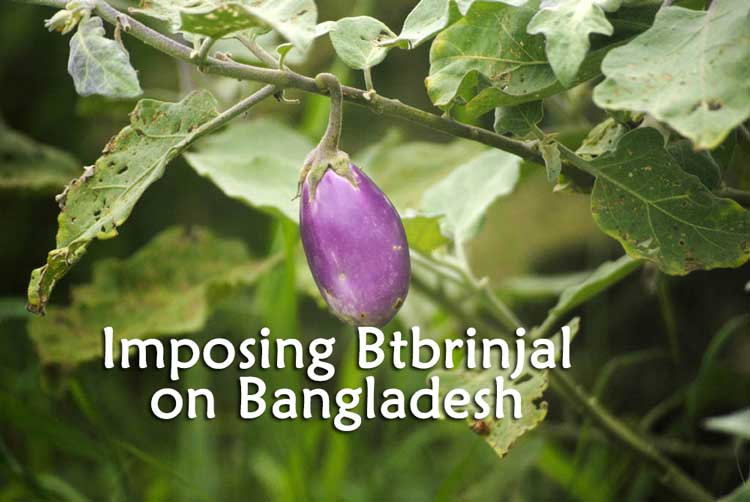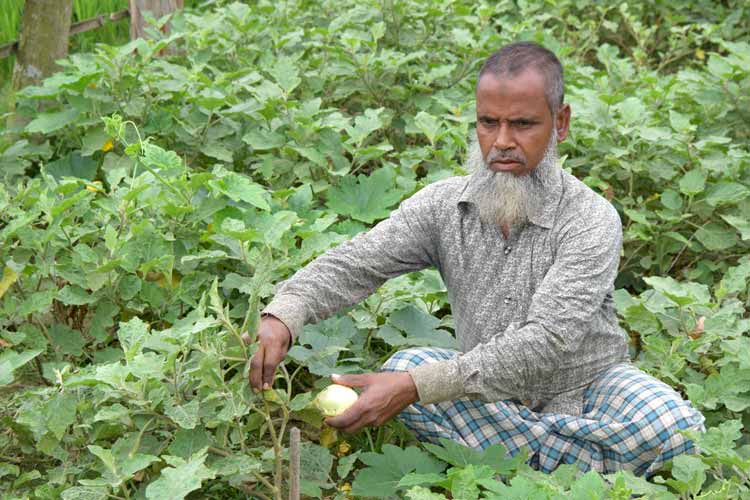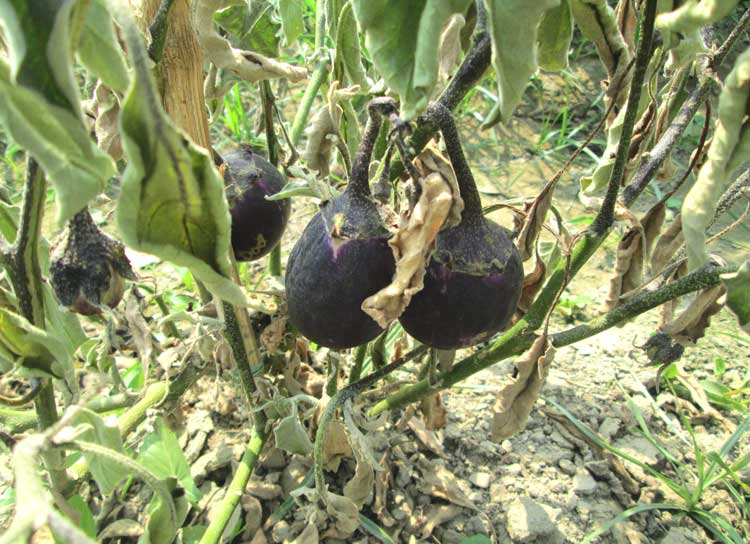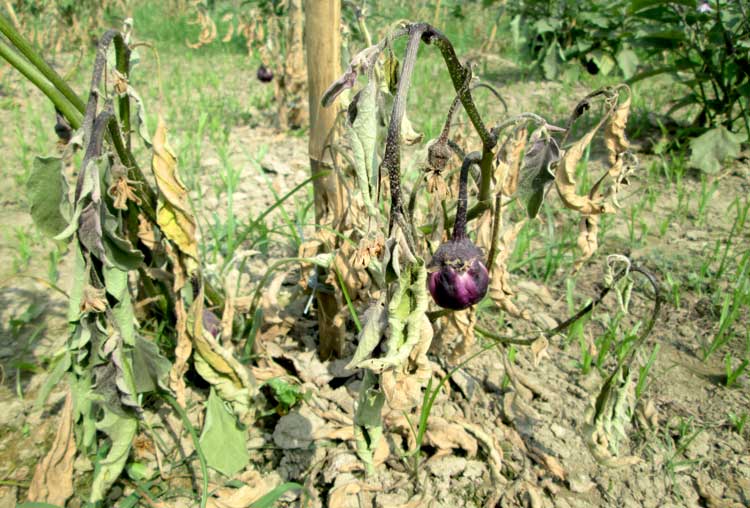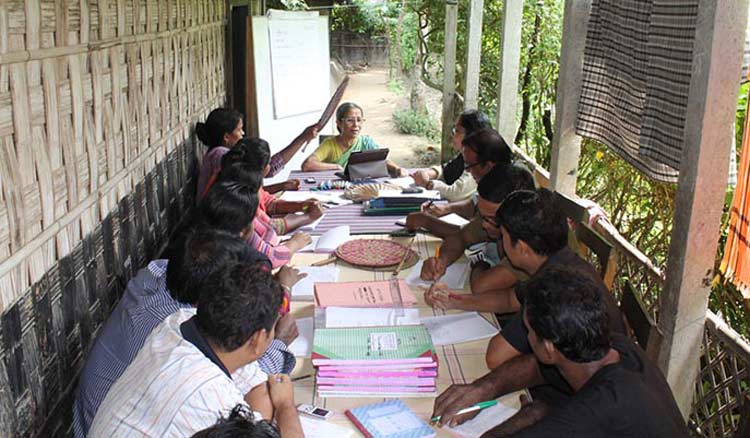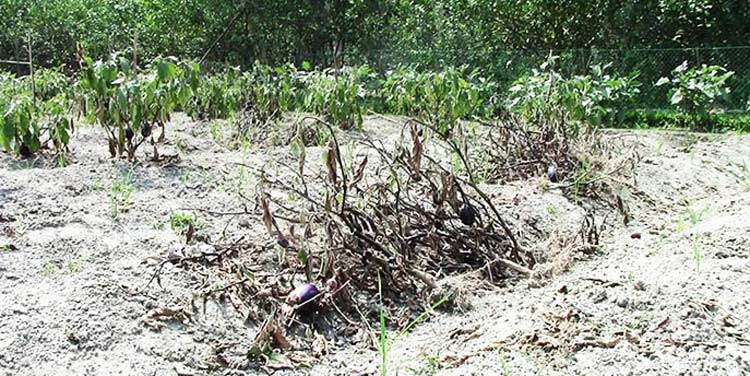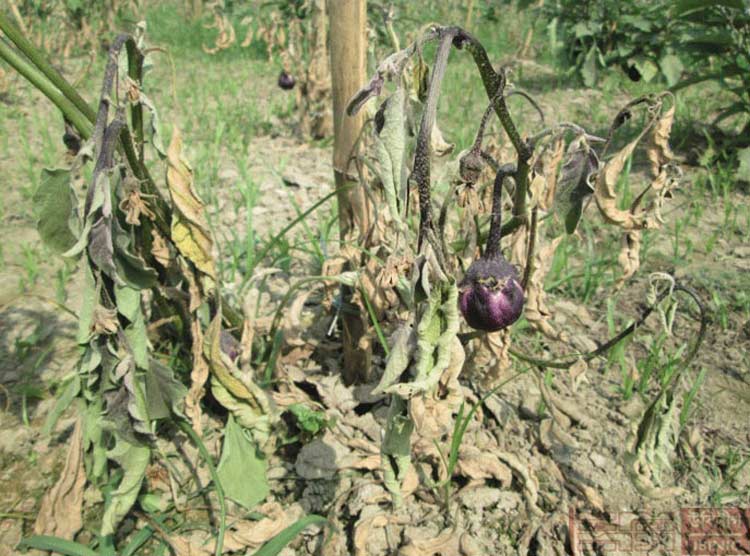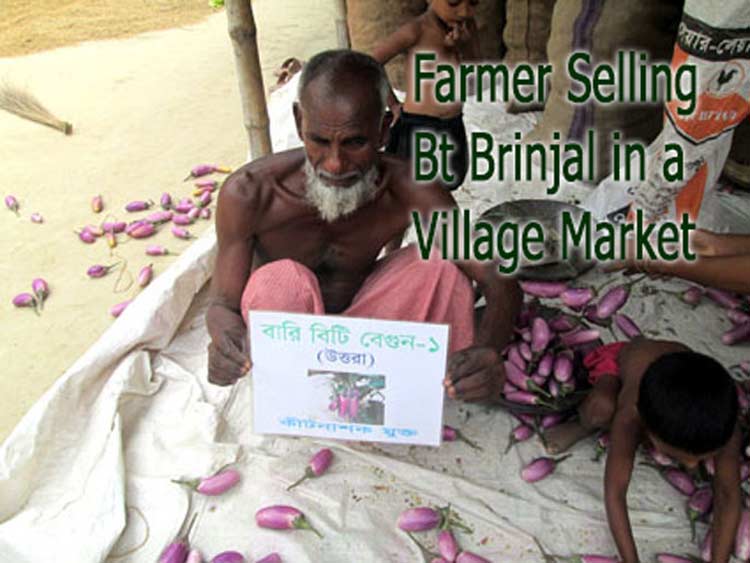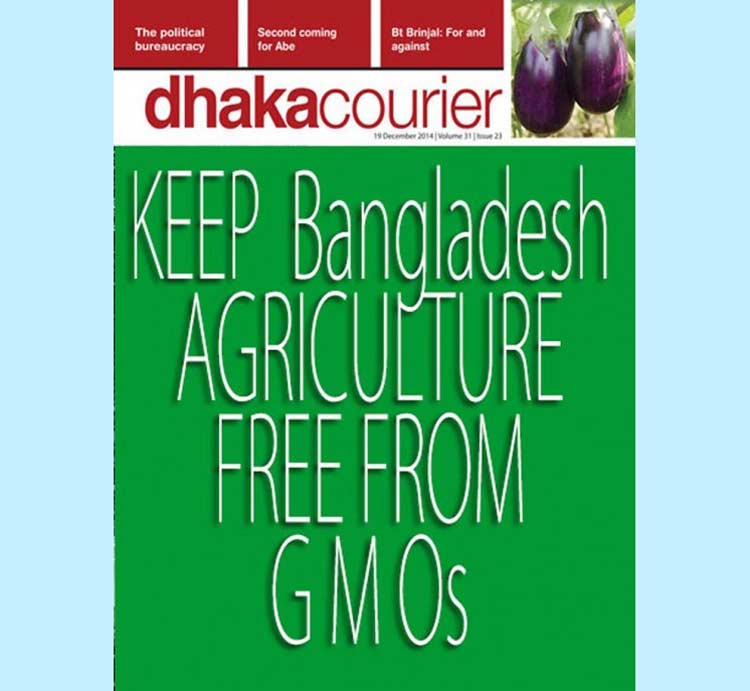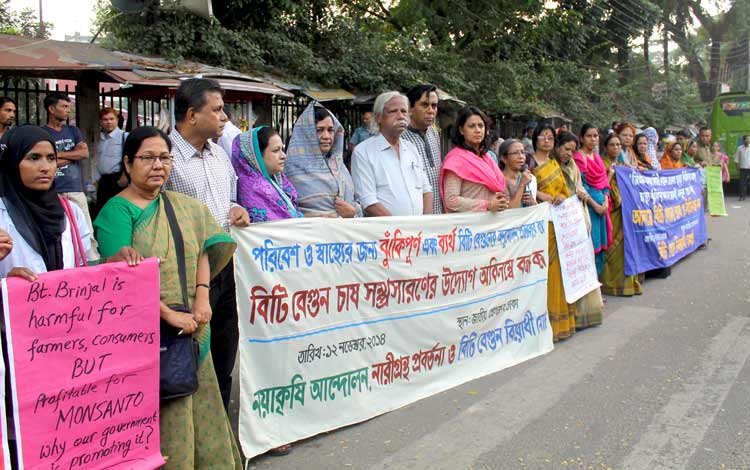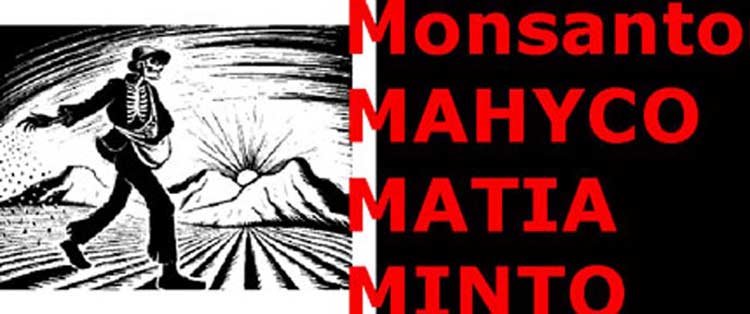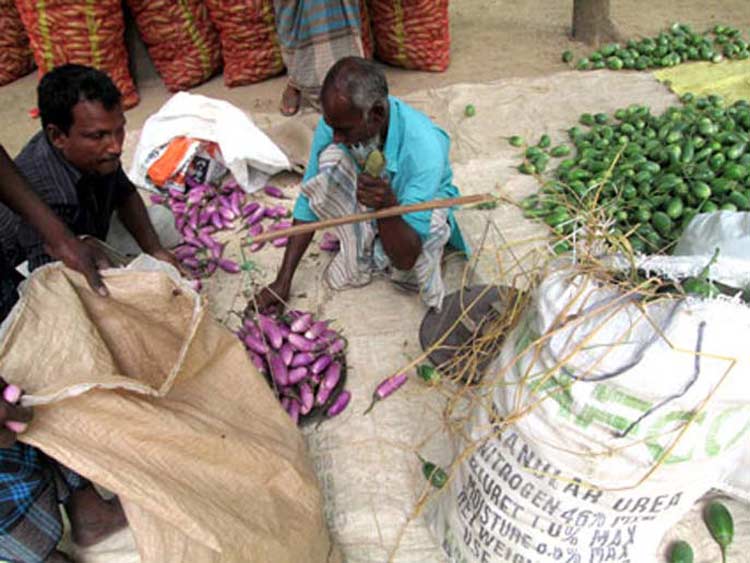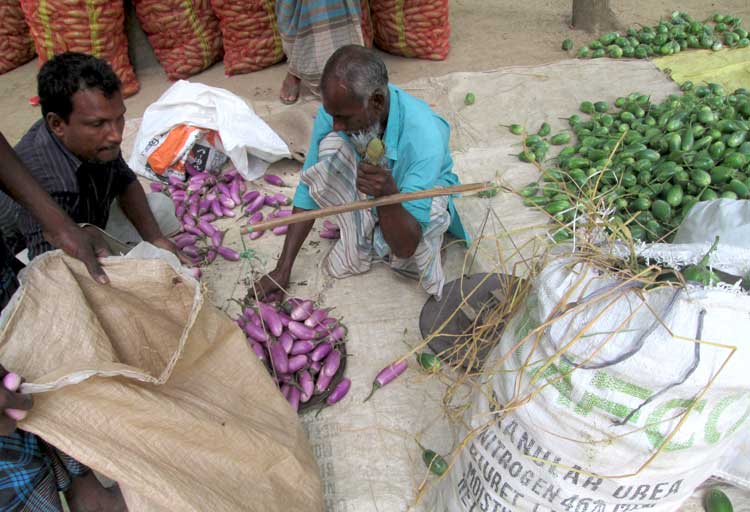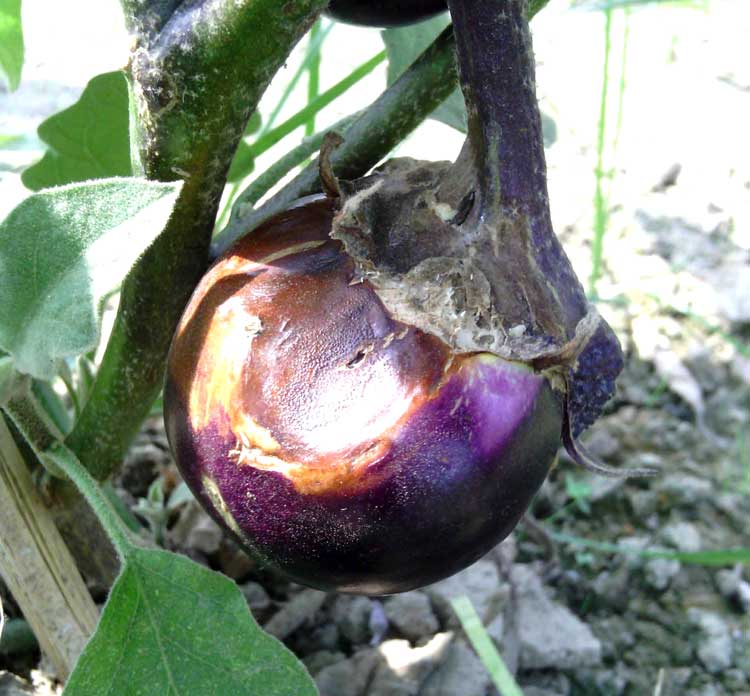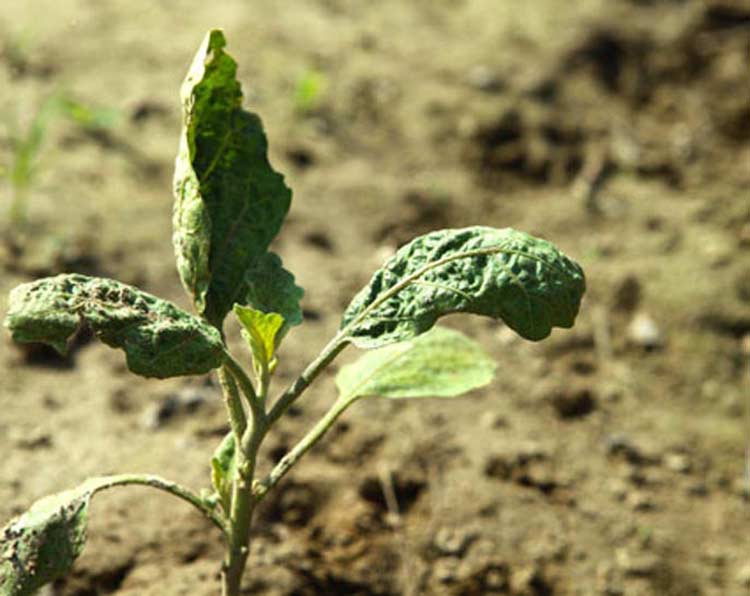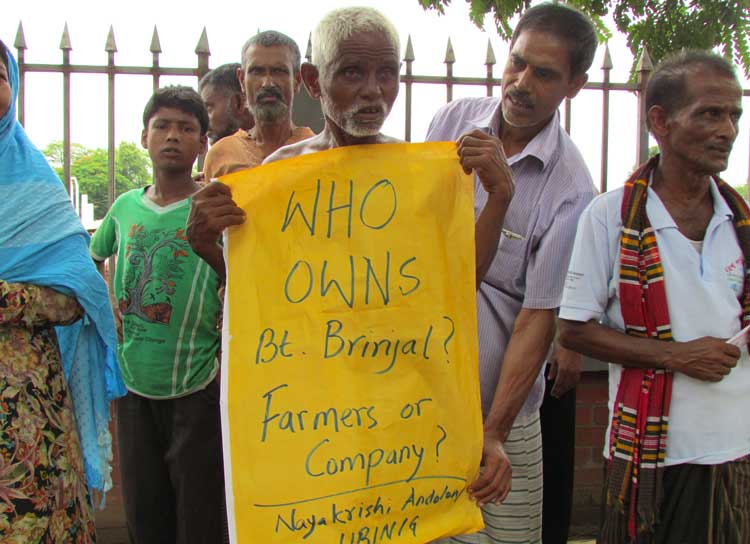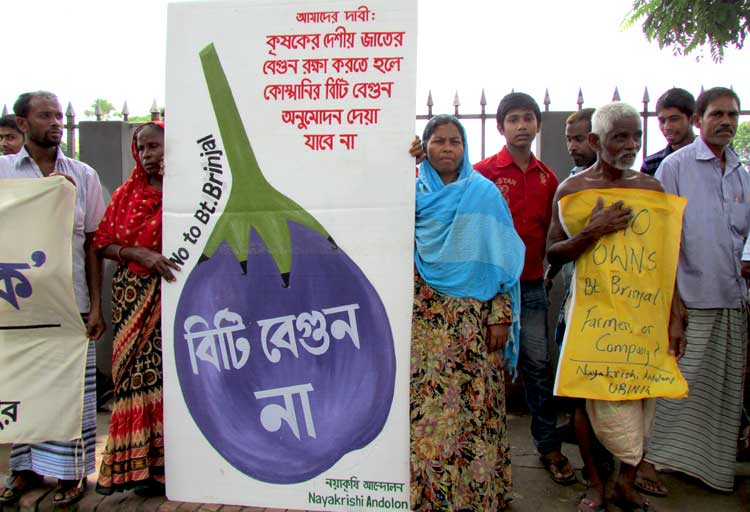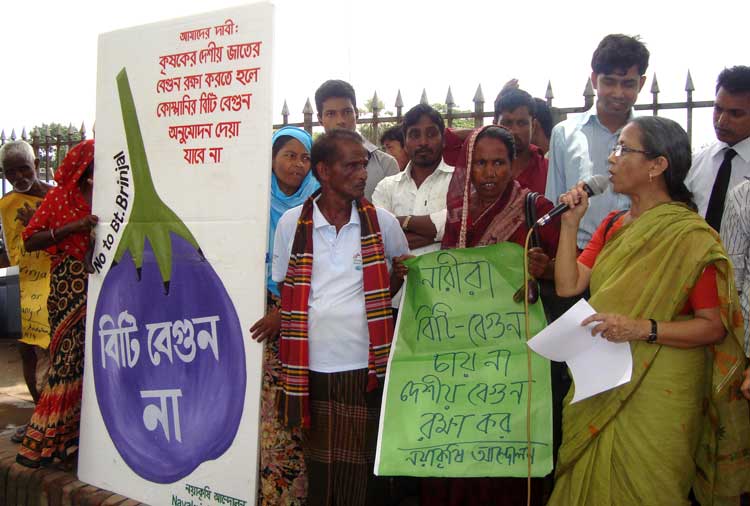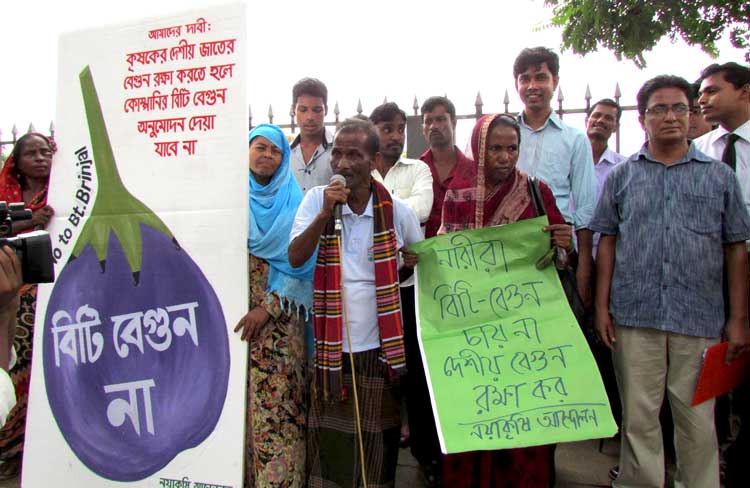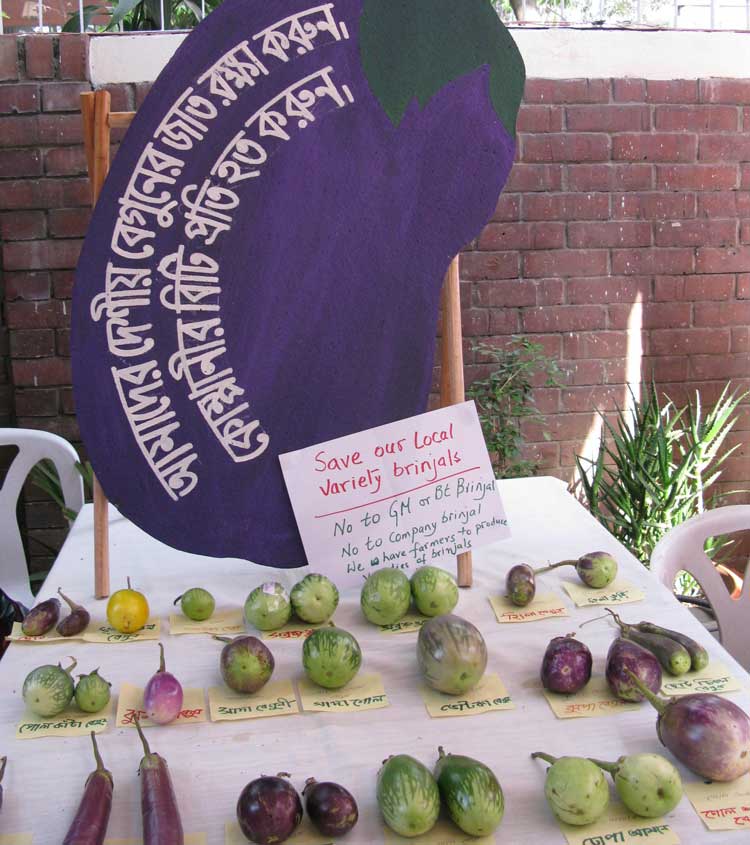Bt brinjal: Alliance for Crooked Science & Corporate Lies
Introduction
Brinjals, locally called Begun (in Bangla) by the people of Bangladesh, are the most common and favourite vegetable. On 17 May, 2020 the New Age, a national daily of Bangladesh published an article of mine [Akhter, 2020] titled “Aubergine Story: Local varieties exists, not GMOs”. In the article, I argued that in the month of Ramadan (month long fasting of the Muslim communities), the demand for brinjal (eggplant/aubergine) is the highest, because it is the main
(Read More)
Bt Brinjal Story: Bangladesh Resisting Monsanto
Monsanto in Bangladesh
Monsanto is not new in Bangladesh. The company has been actively selling RoundUp Ready in the Tea Gardens as Glyphosate herbicide for over two decades. Tea Gardens are located in remote areas in the north eastern geographic location of Bangladesh. It is only recently that Health hazards of unprotected tea garden workers are revealed only recently and linked to the unprotected use of pesticides and herbicide. However, the name of the herbicide company was never known until Monsanto representative in Bangladesh disclosed to the anti-Monsanto activists in 199 (Read More)
‘Adoption’ & abandoning of Bt brinjal cultivation: Farmers’ Experience Survey
i. UBINIG conducted a short survey in December, 2018 and early January, 2019 on the adoption and abandonment of Bt brinjal by farmers on the basis of the claims of higher adoption of Bt brinjal by farmers. Forty-eight farmers were interviewed out of the list of 106 farmers who were selected by Department of Agricultural Extension for cultivation of Bt brinjal during 2014-15. The purpose of the survey was to check if the farmers receiving seedling in the early rounds are continuing for the later rounds till 2018-19. Farmers were given seedlings of fo (Read More)
Comments on IFPRI Study Report published in a national daily
Dhaka Tribune, a Bangladeshi daily, published a report by Reaz Ahmed on IFPRI ‘s Btbrinjal study on March 7th, 2019: “5-yr after releasing its first GM crop Bangladesh says farmers gain by adopting Bt brinjal”. Till now we have not been able to get a copy of the IFPRI report. Nevertheless, until we could put our hand on the full report and make our detail critique, we felt the media report demands some immediate response.
(Read More)
‘Misrepresentation’ of Bt Brinjal farmers for corporate interest
Deb Carstoiu, Managing Director of plant biotech communications at CropLife International wrote a report on Bt Brinjal farmer Anisur Rahman Sheikh in a northern district of Bangladesh. According to Carstoiu, ‘Rahman Sheikh recently planted biotech eggplant for the first time. The biotech variety (Bt eggplant) repels or kills the fruit and shoot borer, and Rahman Sheikh is confident that it will make a difference for him and his family’. (see Deb Carstoui's 'PPPs: Planting the seeds of (Read More)
Bt brinjal failed in farmers' field
Bt Brinjal affected by aphid
Brinjal is the most important vegetable in Bangladesh, a common crtop farmers grow for family consumption as well as for the market. Nationally it is grown in about 50,000 hectares of land in two major seasons: winter and summer. However there are varieties that can be grown round the year. However seasonal varieties are culturally preferred. Indigenous nutritional knowledge claims that those fruits and vegetables are best for health if they go by seasons.
Bangladesh is a country of wide range of varieties of brinjals. Despi (Read More)
Bt Brinjal: Put a label on it
Consumers have the right to know what they are buying
The field cultivation of genetically modified brinjal (also known as Bt Brinjal) was conditional. In October 2013, the National Committee on Biosafety (NCB) imposed seven conditions to be followed in field cultivation. One of these conditions was labeling -- if Bt Brinjal is brought to the market, they must be labelled, ie it should be clearly stated if it is GMO.
Since 2014, two rounds of cultivation showed very poor performance, and the brinjals which were brought to the market were not labelled. Consumers did not kn (Read More)
Bangladesh NGO report challenges BBC claim of 90% success for Bt brinjal
The narrative of GMO success is unravelling, writes Claire Robinson
Recently we published an article about a report by the policy research organization UBINIG, which presented the results of its investigation into the performance of GM Bt insecticidal brinjal (eggplant) in its second year of cultivation in Bangladesh.
http://gmwatch.org/news/latest-news/16537
UBINIG’s report found that officials from the Ban (Read More)
Bt brinjal on "life support" in Bangladesh
A policy research group has concluded that the GM crop was a “miserable failure” in its second year of cultivation. Claire Robinson reports
http://gmwatch.org/news/latest-news/16535
Bt brinjal (eggplant) has proved a “miserable failure” in its second year of cultivation in Bangladesh, according to a new report by the development policy research group, UBINIG. Unimpressed by claims that Bt brinjal has proved a boon to farmers, the group conducted its own field investigations and concluded that this GM crop is on “life support”.
(Read More)Bt Brinjal Is Under ‘LIFE SUPPORT’
EXPERIENCES OF FARMERS IN SECOND ROUND FIELD CULTIVATION
INTRODUCTION
This is UBINIG’s report on the second round field cultivation of Btbrinjal, an ongoing monitoring of the unethical promotion of GMOs. There are evidences that in the previous field cultivation, the Btbrinjal promoters completely ignored the scientific precautionary ethics and international protocols and principles with regard to the release of GMOs in the environment, particularly (Read More)
‘Bagary Baingan’ on the menu of Modi: Was it Bt. Brinjal?
Indian Prime Minister Norendra Modi’s eventful two-day visit ended on the 7th June, 2015 in Bangladesh. Mr. Prime Minister is a vegetarian and therefore as a host Bangladesh government, particularly Prime Minister Sheikh Hasina herself took special care to select different kinds of vegetarian foods. The Hindustan Times reported on 7 June, 2015 titled “100 veg dishes for Modi” including special daal, khichdi, dhokla and Bangladesh’s special sweets. In The NDTV news it was elaborated further, such as for starters, there was a Gujarati speciality - Kaman Dhokla, accompanied with a yoghurt corriander chutney. For main (Read More)
Turning Bt. Brinjal failure into a propaganda of success
Since the beginning of the Bangladesh government clearance for field cultivation of GM food crop Bt. Brinjal, it has been a scandal. The genetically engineered crop failed miserably in the chosen farmers fields of Bangladesh, despite the careful selection and training of the farmers. Promoters of GMO adopted more scandalous options. They refused to review the experiment by the normative standard of strict scientific experiment and the international ethical standard of precautionery principle obligatory for potential hazards from GMOs. Instead the promoters took more aggressive attempts to carry out propaganda based on false claims. The a (Read More)
Bt. Brinjal: Forced cultivation and poor performance!
Bangladesh is one of the unfortunate countries in Asia, where GM food crops are being forced for introduction without properly following the precautionery principle to protect biological environment and health and proper rules as laid down by international obligations and domestic bindings, particularly related to Biosafety. Genetically modified Bt. Brinjal is one such crop which is a very common vegetable across class, culture and geographical location, and also known to be in the centre of origin, yet the government has approved it for field cultivation in October, 2013 through the national gene bank run by Bangladesh Agricultural Resear (Read More)
Protest Against US Ambassador Promoting Bt. Brinjal in Bangladesh
Outgoing US Ambassador to Bangladesh recently wrote an article in Dhaka Courier uncritically promoting genetically modified Bt Brinjal in a country considered belonging to the bioregion where global wealth of biodiversity originated. He often expresses his love for Bangladesh, and we, as a humble nation, never failed to acknowledge his feelings. Nevertheless, his article stands absolutely contrary to the prem (love) he often likes to explicitly project. ( See 'From Iowa to Bangladesh (Read More)
Bt Brinjal terror spreads in the country and crosses border
The environmental, farmers and women’s groups are outraged at the news that despite the failure of the first field cultivation scheme, the government of Bangladesh has taken a programme to distribute saplings of genetically modified Bt brinjal among over 100 farmers. Dr. Rafiqul Islam Mondol, Director General of Bangladesh Agricultural Research Institute (BARI), told The Dhaka Tribune “We selected 106 farmers in 17 districts to distribute the saplings. The distribution began in October 2014”. Each farmer is given saplings of two varieties for half bigha (16.5 decimal) land, though BARI initially decided to suggest one bi (Read More)
BT BRINJAL COMMERCIALISATION: Alarming alliance of four M’s
The Bangladesh Agricultural Research Institution (BARI) is a public institution under the agriculture ministry and is obliged to serve public interest. As a public research institution, its primary task is to decide research priorities that must contribute to the benefit of the farming community, enhance the formal and informal scientific knowledge base of Bangladesh and strictly protect natural, biological and intellectual property of the people of the country.
Unfortunately, the institution has miserably failed to meet to its obligation and responsibi (Read More)
Protest against selling of Bt. Brinjal
Selling Without Label: Breach of Terms of Approval, Immediately stop cultivation and marketing of Bt Brinjal. Stop selling GM crops without public awareness of adverse impacts, demand by Bt Begun Birodhi Morcha (Coalition against Bt Brinjal)
Bt. Begun Birodhi Morcha (Coalition against Bt Brinjal) expressed concerns over the open selling of Bt Brinjals cultivated in few districts of the country. According to the approval given for limited cultivation of Bt Brinjal at the farmers’ field it was mandatory to label Bt Brinjal at the time of selling. This in line with the intern (Read More)
Bt Brinjal in the open market without labels !
BARI has miserably failed in its attempt to show that Bt brinjal is resistant to fruit and shoot borer (see the series of article in UBINIG).
It should have been investigated by independent qualified geneticists, entomologists and agronomists in order to unveil the mode of inheritance and heritability of attributes linked with FSB (Leucinodes orbonalis).The BARI, claiming to be one of the most prestigious institution of Bangladesh, is now lost its vision, blindly following the political directives instead of scientific wisdom. Such mindless act of dea (Read More)
BtBrinjal: Non-compliance of approval terms!
Introduction
Bt brinjal is a GMO or Genetically Modified Organism. Crystal gene from Bacillus thuringiensis has been inserted into brinjal genome to increase the resistance of brinjal against Fruit and Shoot Borer (FSB) insect. Bangladesh Agricultural research Institute (BARI) has conducted this research with the support of ABSP II of USAID. BARI received the seeds of Bt brinjal from Maharastra Hybrid Seed Company (MAHYCO), India. There was no innovation by BARI scientists, they only used the Monsanto-Mahyco technology to conduct experiment with the genetically modified Bt. Brinj (Read More)
Farmers are cheated in Bt Brinjal ‘field cultivation’: A failed attempt at the cost of risks to human health and environment
On 22nd January, 2014 twenty farmers from four districts were given the saplings of Bt Brinjal in ceremony organized by Bangladesh Agricultural Research Institute (BARI) at the Bangladesh Agricultural Research Council (BARC). The Agricultural Minister Matia Chowdhury gave out the trays of saplings along with a booklet. The farmers selected by BARI were happy because they thought they were fortunate ones to be chosen for such a ceremonial distribution of saplings. Matia said while addressing as the chief guest, “We have decided to start cultivating Bt brinjal after different necessary tests at home and abroad. We took long time to exp (Read More)
Mahyco ‘owns’ Bt Brinjal, not BARI and never the farmers!
On October 30, 2013 Bangladesh National Committee on Bio-safety (NCB) approved the application of Bangladesh Agricultural Research Institute (BARI) for limited-scale cultivation and marketing of genetically modified eggplant, known as Bt Brinjal amid protests by environmental and farmers groups. The resistance against Bt Brinjal is increasing on issues related to serious threat to bio-safety and health. The authorities have failed to prove any agronomic value of the genetically engineered product and the claims are based on faulty methodology. The farmers are squarely resisting against patenting and explicit attempt of bio-piracy through t (Read More)
Farmers’ protest against Bt brinjal introduction
The Bangladesh Agricultural Research Institute (BARI) organised a formal distribution of seedlings of Bt Brinjal to selected farmers on 22nd January, 2014 following the approval for limited cultivation on 30 October 2013. Begum Matia Choudhury, Agriculture Minister has formally handed over the seedlings of Bt brinjal among 20 farmers at Bangladesh Agricultural Research Council (BARC), Dhaka. The selected farmers were from of four districts Gazipur, Jamalpur, Rangpur and Pabna. There were protests against such initiative and it seemed that the government cared less about any criticism against Bt Brinjal. In Dhaka, the Coalition against Bt (Read More)
“Approval” story of Bt Brinjal: Continuation from India to Bangladesh
Bt. Brinjal, (also known as eggplant or aubergine), a genetically modified food crop, inserted with a gene from the soil bacterium Bacillus thuringiensis has been approved by the National Committee on Biosafety (NCB) in Bangladesh for limited scale cultivation by farmers. In a notification (in bangla) of October 30, 2013 bearing a reference No.22.00.0000.073.05.003.2012-271 the Environment Section-2 of the Ministry of Environment and Forestry provisionally approved the petition of BARI to cultivate Bt Begun varieties 1,2,3 and 4 in a limited scale at the field level by following seven conditions:
1. BARI Bt. Brinjal 1, 2, 3 & 4 (Read More)
Bangladesh to become guinea pig for Bt Brinjal
It is very unfortunate that Bangladesh government, which is now in Poll time period (next election is in January, 2014) has taken a step for a policy disregarding public opinion and which has serious implications for its people as consumers, for farmers and for environment. The National Committee on Biosafety (NCB) officially released four Bt brinjal, which is infused with pest-resistant gene. According to newspaper reports, the four varieties of BtBrinjal — Bt Brinjal-1 (Uttara), Bt Brinjal-2 (Kajla), Bt Brinjal-3 (Nayantara), and Bt Brinjal-4 (Iswardi local) — would first be released on limited scales as per a production manu (Read More)
International Scientists Say “No” to Bt Brinjal approval
Despite indefinite moratorium on Bt Brinjal trial in India and Supreme Court ban in the Philippines, it is alarming that Bangladesh is preparing for the approval for commercial release.
In India, similar attempts to introduce Bt. Brinjal in the market led to controversy and on February 9, 2010, the ministry of environment and forests imposed a moratorium on Bt Brinjal. In the absence of scientific consensus and opposition from state governments and others, the ministry decided to impose a moratorium on the commercialisation of Bt Brinjal u (Read More)
Bt Brinjal and Begoon
Bangladesh Approving Bt Brinjal !!
Risk to Environment, Biodiversity and Health
"Begoon" (Brinjal or Eggplant) is a very common and favourite vegetable in Bangladesh. It is even becoming an international vegetable along with okra and cauliflower because of the Indian Restaurants in Europe and North America. But for us in Bangladesh, it is not just a vegetable, it has more link with the social, cultural and economic lives of rural people, particularly women. It is cultivated in the agricultural fiel (Read More)
